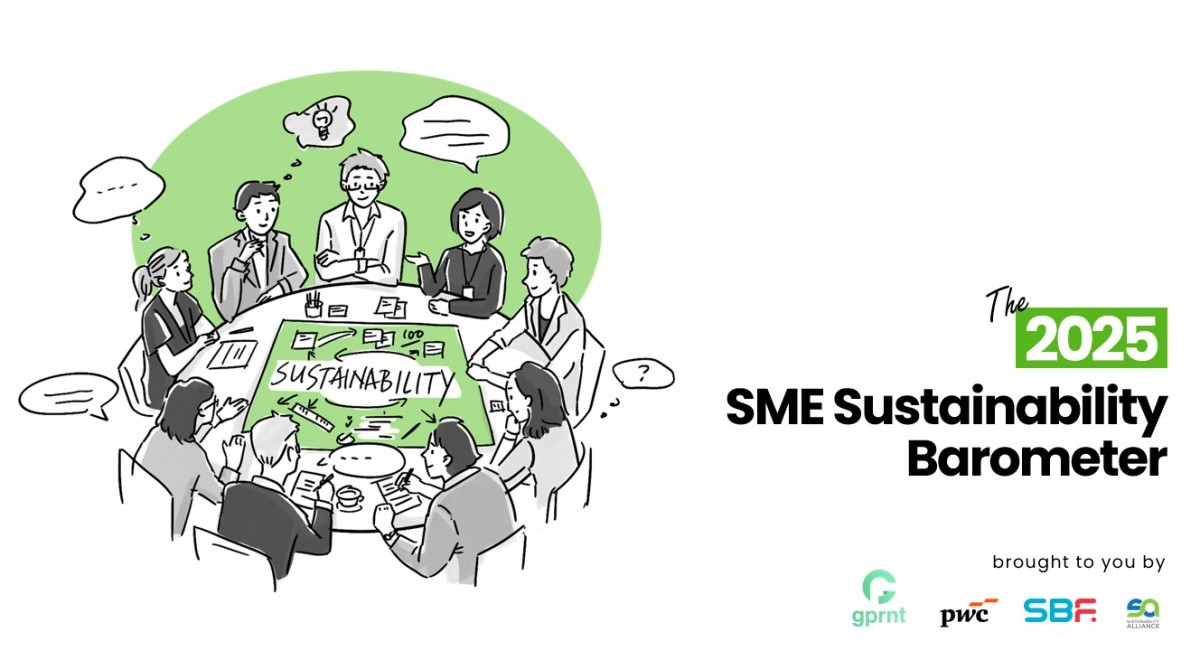According to the inaugural SME Sustainability Barometer study by Gprint and PwC Singapore, three in four SMEs admit they struggle to kickstart sustainability journeys due to constraints in money, skills and time.
This is compounded by rising economic pressures stemming from geopolitical tensions, leaving “little bandwidth” to properly explore the range of available programmes and opportunities.
See also: Carbon accounting tools Gprnt, SEFR, ESGenome help firms calculate emissions
Hence, more than seven in 10 SMEs surveyed have not accessed any form of government assistance or available support for their sustainability initiatives.
The Singapore Business Federation (SBF) and Sustainability Alliance (SA) supported the study by consulting firm PwC Singapore and Gprnt, a sustainability reporting platform that began as an initiative by the Monetary Authority of Singapore. The study engaged SMEs through surveys, interviews and roundtables with trade associations.
See also: 42 SMEs graduate from CDL’s SME Supplier Decarbonisation Queen Bee Programme
“When SMEs go green, they don’t act alone. They lift the networks around them — buyers, suppliers, customers and financiers. They green the value chains they power, and in doing so generate high-quality data from the ground up,” says Lionel Wong, Gprnt’s CEO.
Gprnt’s digital utilities play a “catalytic role” in helping businesses to automatically generate their basic sustainability metrics at no cost, which greatly lowers the barrier for local SMEs to get started, adds Wong.
With participation from PUB, the Energy Market Authority and the Government Technology Agency of Singapore’s (GovTech) Myinfo business service, Gprnt draws on companies’ water, town gas and electricity consumption values to generate their emissions profile.
Wong says: “To truly bring SMEs into the fold, we need to go further by layering clearer market signals and stronger incentives atop these foundations, in the form of green procurement, financing and market access opportunities. This requires collective effort across the public and private sectors to make sustainability not just viable, but valuable.”
Five recommendations
Findings from the study were launched on Nov 12 at the Singapore FinTech Festival 2025 alongside five recommendations to help “enhance the sustainability value proposition” for SMEs.
To stay ahead of Singapore and the region’s corporate and economic trends, click here for Latest Section
One recommendation is to help SMEs “realise the value of sustainability”. According to the study, only 10% of SMEs starting out on sustainability reported measurable gains, compared to nearly half of those in a more mature state.
“A central case bank that consolidates success stories, supported by data and benchmarks to quantify the benefits, could spur more SMEs to follow suit,” say the authors.
The authors also recommend helping SMEs keep costs trim through “shared solutions”. Some 46% of respondents cite high costs of sustainable materials and solutions as a major barrier.
“SMEs can reduce expenses by pooling common activities to achieve economies of scale, with trade associations playing a pivotal role in identifying shared challenges and co-creating sector-wide solutions with government partners,” say the authors.
Following these recommendations, Gprnt, SBF and SA will engage with partners across the public and private sectors to study the feasibility of implementing these initiatives.
Sustainability can easily take a back seat in today’s tough economic climate, says SBF CEO Kok Ping Soon. “SMEs need to consider decarbonisation as an investment to reduce costs through utilities savings and gain new business by fulfilling demand for sustainable products [and] services. SBF is committed to help SMEs translate sustainability from aspiration to action, for meaningful and lasting business impact.”
Frank Phuan, CEO of the four-month-old Singapore-headquartered renewable energy platform Equator Renewables Asia and co-chair of SA, says: “The Sustainability Alliance supports the call for closer collaboration and collective action to help SMEs go green. Together with Gprnt and SBF, we invite trade associations and partners across the ecosystem to pool resources and co-create sustainability solutions that achieve economies of scale for SMEs and help them begin their green journeys.”
Photos and infographics: Gprnt
Read more about sustainability reporting and climate-related disclosures:
- S’pore ‘not at all’ softening commitment to sustainability reporting: Ravi Menon (September)
- SGX RegCo’s climate reporting extension ‘very generous’, say experts (September)
- Carbon accounting tools Gprnt, SEFR, ESGenome help firms calculate emissions (August)
- SGX RegCo expects ‘quality reports’ aligned with ‘ambitious’ ISSB standards, despite feedback of slow progress (August)
- SBF inks MOU with WBCSD to list product-specific carbon footprint data (May)
- More Southeast Asian firms have started climate reporting, but quality of disclosures trails major markets: EY (March)
- Nearly all listcos have begun climate reporting; SGX RegCo still mulling Scope 3 roadmap (March)
- SBF launches Singapore Emission Factors Registry as ‘single source of truth’ for localised emissions data (October 2024)
- New digital playbook launched to help S’pore firms reduce Scope 2 emissions (October 2024)
- SBF, Bain & Co launch SME-focused decarbonisation programme, starting with food manufacturers (October 2024)
- SGX RegCo will require ISSB-aligned climate-related disclosures from all listed issuers starting FY2025 (September 2024)
- Large private companies must report annual climate-related disclosures from FY2027: Acra, SGX RegCo (February 2024)




